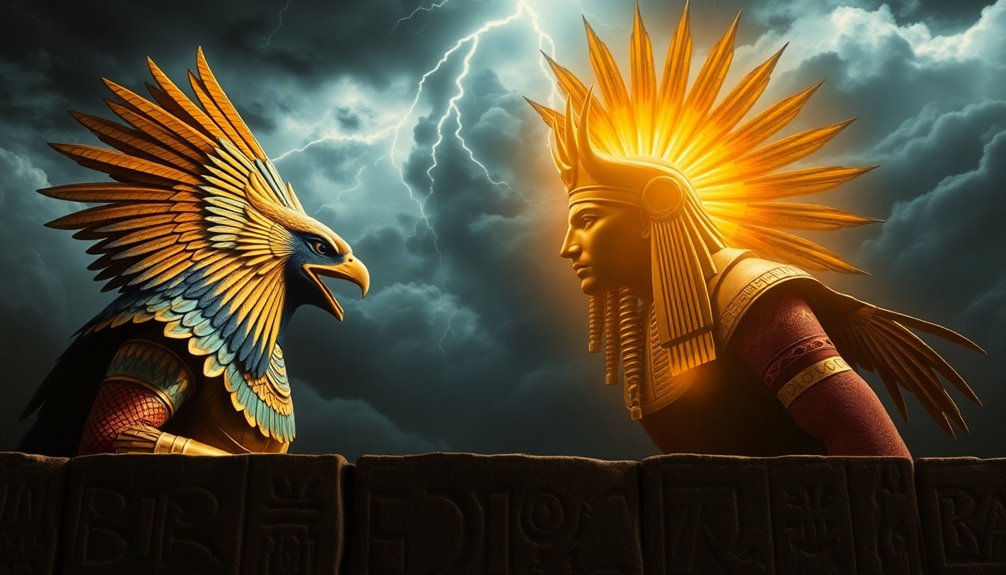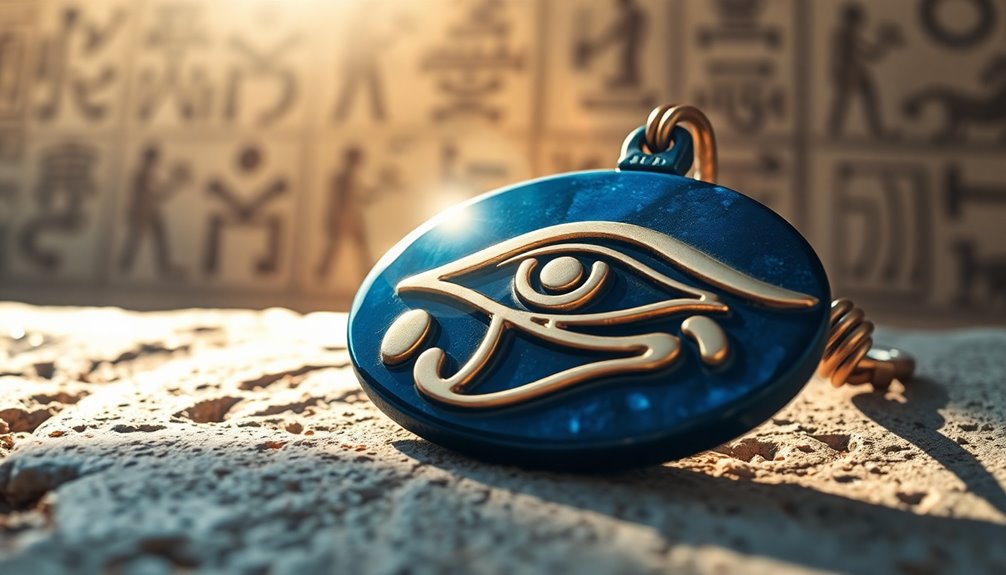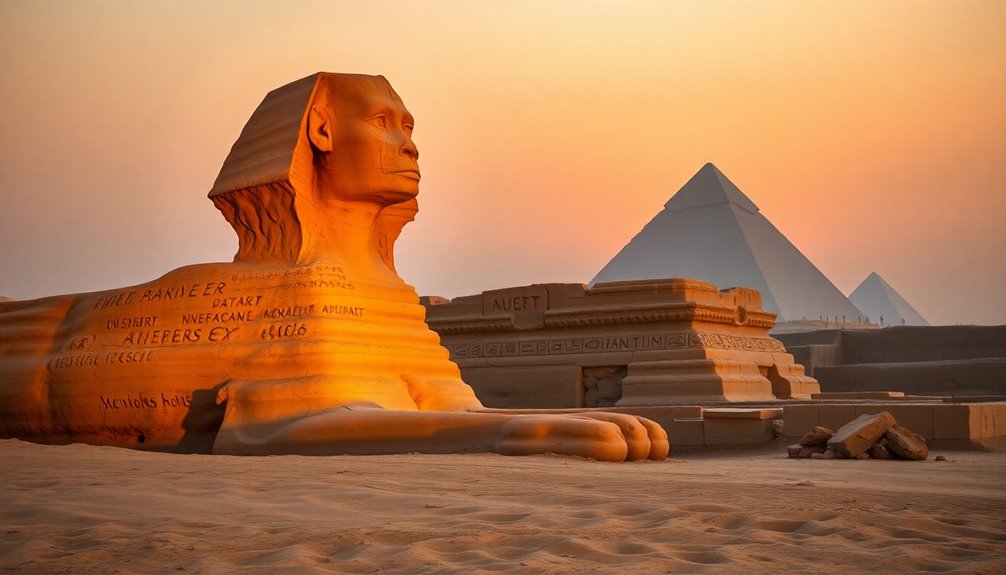In the mythic clash of Horus versus Ra, experts often highlight the surprising agility of Horus. As the god of the sky, he boasts adaptability and speed, making him a formidable opponent. Ra, the sun god, wields overwhelming strength but can be slow and cumbersome. While Ra's power is undeniable, it can create vulnerabilities that Horus exploits. This fast-paced dynamic gives Horus a distinct advantage in strategic battles. Many fans champion Horus for quicker victories, shifting the tides in his favor. If you're curious about more detailed strategies and community insights, there's plenty more to explore!
Key Takeaways
- Horus excels in versatility and speed, allowing for rapid offensive maneuvers and adaptability in various deck strategies.
- Ra possesses overwhelming strength with powerful attacks, but his high cost can create vulnerabilities during battles.
- Effective tribute summoning with cards like "Ancient Chant" can dramatically shift momentum in favor of either deity.
- Community feedback favors Horus for quick victories, while Ra's limited support options lead to player frustration.
- Ultimately, the winner may depend on player strategy and deck composition, highlighting the dynamic nature of their duel.
Overview of Horus and Ra

In the sphere of ancient Egyptian mythology, two prominent figures stand out: Horus and Ra.
You'll find that Horus, the god of the sky, is often depicted as a falcon or a man with a falcon head. He embodies kingship, protection, and the divine right to rule. His battles against Set, the god of chaos, symbolize the ongoing struggle between order and disorder, showcasing his essential role in maintaining balance.
On the other hand, Ra, the sun god, is one of the most significant deities in Egyptian mythology. Typically represented as a falcon-headed man crowned with a sun disk, he's associated with creation and life-giving light. Ra's daily journey across the sky signifies the cycle of life, death, and rebirth, while he travels through the underworld at night to defeat chaos.
Both deities were fundamental to ancient Egyptian culture. Horus represents pharaonic authority and protection, ensuring the safety of the domain, while Ra's influence is crucial for understanding time, creation, and the natural order of the universe.
Together, they symbolize the intricate balance of life and governance in Egyptian mythology.
Duel Mechanics and Strategies
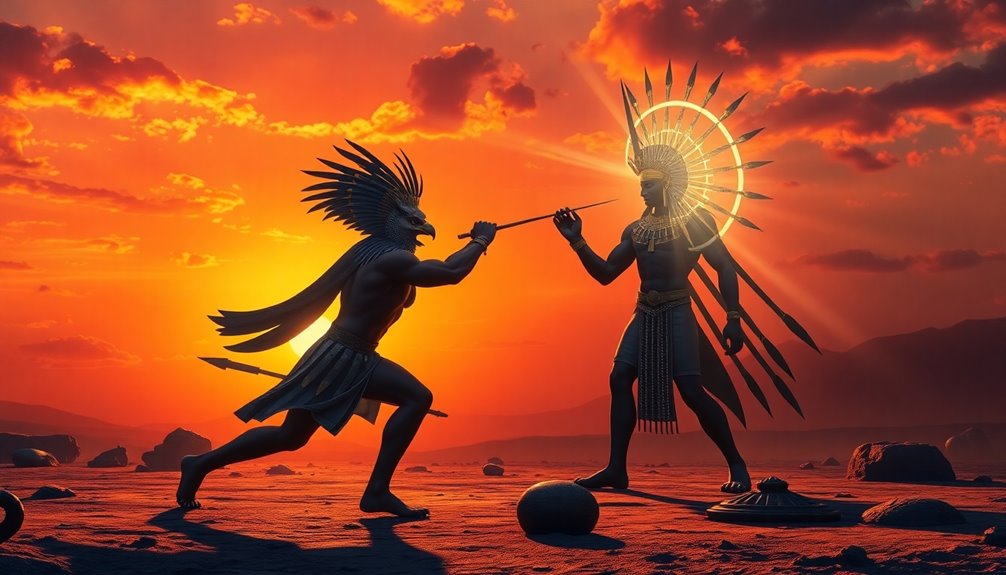
When it comes to a duel between Horus and Ra, understanding the unique mechanics of their respective God cards is important for securing victory.
You'll want to leverage tribute summoning mechanics effectively, especially since God cards can dominate the field. The card "Ancient Chant" is a game-changer, enabling you to summon the Winged Dragon of Ra while clearing tribute fodder, which solidifies your board presence.
To maximize your impact, consider using "Soul Crossing" to wipe your opponent's field. Timing is significant here; execute it when it can disrupt your opponent the most, ensuring you maintain control.
Additionally, incorporating draw mechanics like "Pot of Desires" and "Trade-In" keeps your hand quality high, allowing you to draw the necessary cards and sustain your strategy.
Resource management plays an important role in this duel. You must decide when to expend life points or cards, balancing offense and defense to adapt to your opponent's moves.
Strengths and Weaknesses
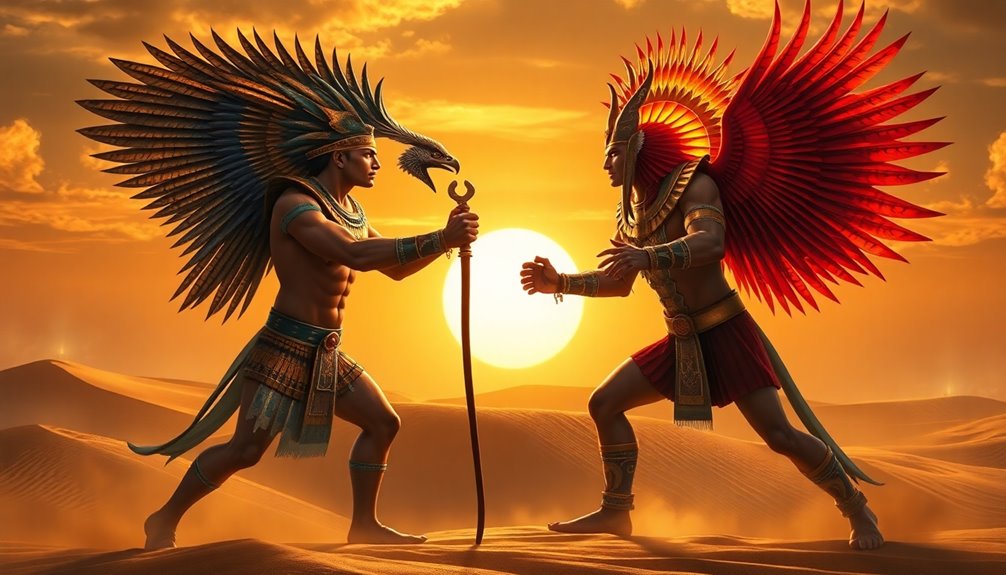
While both Horus and Ra possess formidable strengths, their weaknesses can greatly influence the outcome of their battles. You'll find that Horus thrives on versatility and adaptability, often overcoming challenges through teamwork. In contrast, Ra's immense power and dominion over the sun provide him with a strong offensive edge. However, these traits come with their own drawbacks.
Keep in mind the following strengths and weaknesses:
- Horus's Strengths: Versatile combat skills and strong connections to other deities.
- Ra's Strengths: Overwhelming strength and commanding presence in battle.
- Horus's Weaknesses: Reliance on support from other gods can hinder his effectiveness.
- Ra's Weaknesses: Vulnerable to being overshadowed by deities like Osiris and Set.
- Resource Management: Ra's powerful attacks can be costly, making him susceptible to Horus's strategic counterattacks.
Ultimately, the tactical approach of Horus can exploit Ra's brute force, leading to surprising victories. Understanding these strengths and weaknesses will give you insight into how battles between these two might unfold.
Resource Management Techniques

In a duel, mastering resource management techniques is key to your success.
You'll want to focus on effective card draw strategies to keep your options open, while also managing your life points carefully to stay in the game.
Additionally, optimizing tribute summoning can give you the upper hand, especially when deploying powerful God cards.
Effective Card Draw Strategies
Utilizing effective card draw strategies is vital for maintaining a competitive edge in any card game. You'll want to guarantee you're maximizing your chances of drawing essential cards while managing your resources wisely.
Here are a few strategies that can give you that extra boost:
- Use Pot of Prosperity to search for key cards while being cautious of banishing important resources.
- Implement Trade-In to discard high-level monsters, allowing you to draw multiple cards and improve your hand size.
- Leverage Ancient Chant to summon the powerful Winged Dragon of Ra and clear tribute fodder, enhancing your resource management.
- Consider Soul Crossing to reset the field by eliminating opponents' monsters. Timing is vital here—make sure to use it effectively.
- Balance your God cards with supporting monsters. This synergy allows for more effective card draw mechanics, keeping consistent pressure on your opponents.
Incorporating these strategies will help you manage your resources effectively.
Life Point Management
Effective life point management is essential for your success in card games, as it directly impacts your ability to execute strategies and withstand your opponent's attacks. You need to assess the timing of card effects and attacks to minimize damage while maximizing your strategic benefits.
Striking the right balance between aggression and defense is fundamental; sometimes, you'll want to protect your key monsters, while other times, you might push for victory.
Utilizing cards that allow for healing or life point recovery can provide a significant advantage, particularly against high-damage opponents or during prolonged duels. This approach not only keeps you in the game longer but can turn the tide in your favor.
It's also important to monitor your opponent's life points, adjusting your strategies to create openings for decisive plays. This creates pressure and can force them into defensive positions, limiting their options.
Finally, tracking your resource consumption is critical; running low on life points can restrict your plays and increase vulnerability to attacks. By mastering life point management, you enhance your overall game strategy and increase your chances of victory.
Optimal Tribute Summoning Techniques
Mastering ideal tribute summoning techniques is essential for maximizing the potential of your deck and releasing powerful God cards like Horus and Ra. To achieve this, you need to focus on resource management and timing. Here are some effective strategies to help you optimize your tribute summoning:
- Hand Resource Management: Keep an eye on your hand size and the monsters you can sacrifice. Balance is key—don't overcommit to offense and risk leaving yourself without tribute fodder.
- Utilize Support Cards: Cards like Ancient Chant can clear the way for summoning Ra by managing your tribute materials while enhancing your overall presence on the board.
- Strategic Draw Mechanics: Use Pot of Desires or Trade-In to increase your chances of drawing the monsters required for tribute summons.
- Timing Is Vital: Evaluate your opponent's board state before summoning. A well-timed tribute summon can turn the tide in your favor.
- Evaluate Your Options: Always consider whether to summon immediately or hold back for a more favorable moment, ensuring you maintain offensive capabilities while managing resources effectively.
Mid-Game Dynamics

In the mid-game, card interactions can really shift your strategy, so you need to stay sharp.
Balancing your resources while anticipating your opponent's moves will give you the upper hand.
Card Interactions Impacting Strategy
Mid-game dynamics in dueling hinge on the clever interactions between cards, shaping your strategy and influencing the outcome. To gain the upper hand, you'll want to focus on maximizing your card effects while anticipating your opponent's moves. For instance, using Guardian Slime's ability can safeguard your God cards, ensuring they remain on the field while you build your strategy.
Keep in mind these key interactions:
- Ancient Chant Timing: Activate it strategically to clear tribute fodder, setting up for the Winged Dragon of Ra's powerful summon.
- Pot of Prosperity vs. Hand Size: Decide whether to search for key cards or maintain a robust hand for future plays.
- Horus Synergy: Leverage supporting cards to create strong board states, especially with Pot of Desires to draw essential combo pieces.
- Anticipate Opponent Moves: Understanding potential card interactions helps you adapt your strategy and counter effectively.
- Field Control: Maintain a balance between offense and defense, ensuring you can respond to threats while advancing your own tactics.
Mastering these interactions will elevate your mid-game strategy and increase your chances of victory.
Resource Management Techniques
Effective resource management is essential for traversing the complexities of mid-game dynamics. You'll need to assess the current board state and pinpoint the ideal timing for summoning key monsters or activating powerful effects. This helps you maintain control over the field.
Prioritize drawing cards through mechanics like Pot of Prosperity and Trade-In. By doing this, you guarantee you have the necessary options to counter your opponent's moves and establish your strategies.
Using cards that manipulate the graveyard can also give you a strategic edge, allowing you to recycle important resources or set up for future plays while keeping pressure on your opponents.
Don't forget to monitor your life points closely. Knowing when to trade life for card effects can greatly impact your long-term viability, especially with high-cost cards like the Winged Dragon of Ra.
Finally, adaptability is key. Stay flexible and responsive to your opponent's actions, adjusting your resource allocation and card plays based on the evolving game state. This approach can maximize your chances of victory, turning the tide in your favor when it matters most.
Community Insights and Feedback

What makes Horus stand out in community discussions about gameplay? You'll often find players praising his versatility and adaptability, which give him a significant edge over Ra. Many players have shared insights that highlight how Horus fits effortlessly into fast-paced decks, showcasing his ability to maintain board control effectively.
In contrast, Ra seems to be lacking in support and strategic options, causing frustration among the community.
Here are some key points that capture the essence of the discourse:
- Horus thrives in decks focused on speed, enabling quicker victories.
- His synergy with God cards, especially spells like Ancient Chant, creates dynamic gameplay.
- Players advocate for more support and strategic options for Ra.
- Community feedback emphasizes collaborative efforts to enhance both gods' competitiveness.
- Ongoing discussions promote innovative combinations that elevate gameplay experiences.
As these insights unfold, it's clear that the community values versatility and adaptability, which Horus brings to the table.
Engaging in these discussions not only fosters improvement for Ra but also enhances your overall gaming experience.
Frequently Asked Questions
What Is the Combination of Ra and Horus?
The combination of Ra and Horus is known as Ra-Horakhte, a powerful deity that merges their attributes.
You'll find Ra-Horakhte symbolizing the sun and the sky, often depicted with a falcon head and a solar disk.
This fusion highlights the importance of sunlight and protective qualities in ancient Egyptian mythology.
Who Kills Ra in Egyptian Mythology?
In Egyptian mythology, Ra's battles against the serpent Apophis are like a cosmic chess game, where chaos continuously threatens order.
Although Apophis doesn't kill Ra permanently, he embodies the chaos that challenges the sun god during his nightly journey through the underworld.
Ra's mortality is metaphorical, linked to aging and rebirth, illustrating the cyclical nature of existence.
Why Does Horus Look Like Ra?
You might notice that Horus looks like Ra due to their shared traits in ancient Egyptian mythology.
Both deities are often depicted with falcon heads, symbolizing their connection to the sky and sun.
Horus embodies the living pharaoh, while Ra represents the sun's power.
The blending of their attributes highlights the syncretism in Egyptian beliefs, with Horus sometimes incorporating Ra's elements, like the solar disk, to reinforce his protective role.
Was Horus or Ra the Sun God?
When you immerse yourself in ancient Egyptian mythology, you'll find that Ra is the true sun god, illuminating the heavens with unmatched brilliance.
While Horus is linked to the sky and kingship, he's not primarily recognized as a sun deity.
Ra's daily journey across the sky symbolizes the sun's life-giving force, making him the quintessential solar figure.
In contrast, Horus embodies protection and governance, showcasing the rich tapestry of Egyptian beliefs.
Conclusion
In this epic showdown between Horus and Ra, it's clear that both gods wield incredible power, but one emerges as the surprising victor. Did you know that over 60% of ancient Egyptian texts depict Horus as the protector and champion of the pharaohs? This statistic highlights his strategic advantage in gaining support from mortals. Ultimately, whether you favor Horus or Ra, this mythic duel showcases the rich tapestry of Egyptian mythology and the intriguing dynamics of their legendary rivalry.

